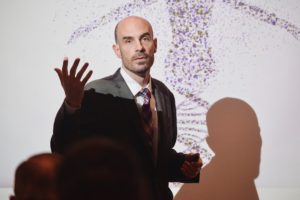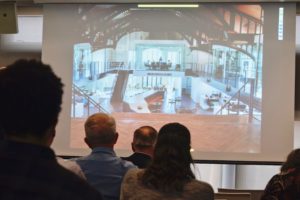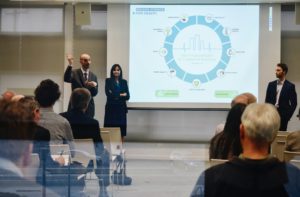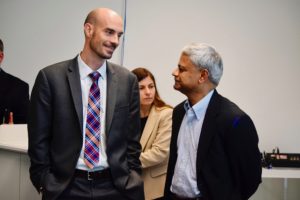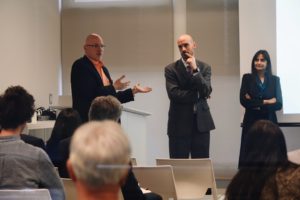Dr. Joseph Allen and Dr. Piers MacNaughton of the Harvard T.H. Chan School of Public Health and Dr. Usha Satish of the State University of New York Upstate Medical University returned home to the Syracuse Center of Excellence yesterday to discuss the results of their second COGfx study “Buildingomics.” After their initial project revealed a connection between indoor environmental air quality (i.e. low carbon dioxide and volatile organic compound levels) and cognitive function, the researchers wanted to follow-up by looking at work environments as a whole. To do so, they posed the following question: what impact does an entire building have?
Moving from the TIEQ Lab at SyracuseCoE, used in the first study, to real-world office buildings across the United States, the group compared and contrasted variables between high-performing non-certified buildings and high-performing green-certified buildings. Their results revealed that green-certified buildings improve cognitive function in general by 26 percent, but people’s overall health improved by 30 percent, shedding light on the health benefits of enhanced environments. Not only were occupants able to to strategize better, respond faster, appear more focused and manage tasks more efficiently, they were also able to sleep better after they left, showing the long-lasting impact better buildings can have. The difference between the two types of buildings? Controllable thermal comfort and lighting options.
At the presentation John Mandyck said he believes these findings are the missing piece of what he calls the “Green Building Trifecta.” Over the years, green buildings have grown in popularity, but now this study has proven the positive physical and mental impact green buildings can have on tenants, creating an even greater benefit for investing in green-certification. Soon, job candidates may be asking their potential employers at interviews: What are the CO2 levels in the office? What’s the ventilation like in the building I will be working in?
Presenters:
- Dr. Joseph G. Allen, Assistant Professor, Harvard T. H. Chan School of Public Health
- Dr. Piers MacNaughton, Doctoral Candidate at Harvard T.H. Chan School of Public Health
- Dr. Usha Satish, Professor, Department of Psychiatry at SUNY Upstate Medical University
- John Mandyck, Chief Sustainability Officer, United Technologies Corporation

